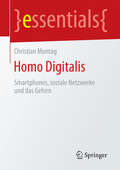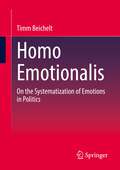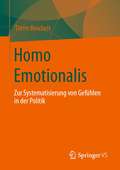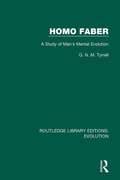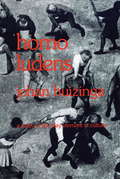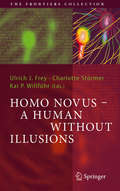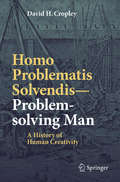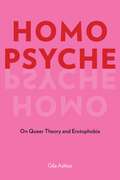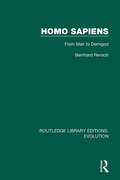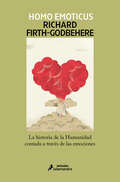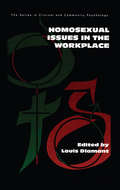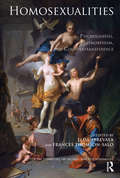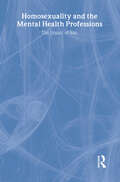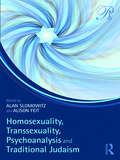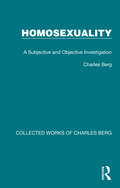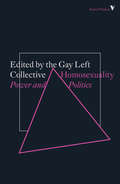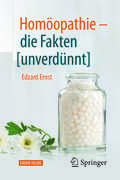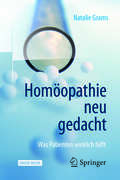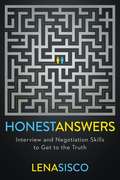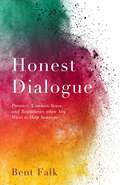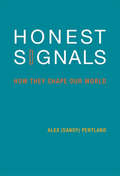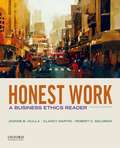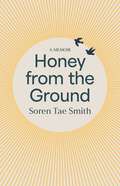- Table View
- List View
Homo Digitalis: Smartphones, soziale Netzwerke und das Gehirn (essentials)
by Christian MontagDas vorliegende essential besch#65533;ftigt sich mit der Nutzung des Smartphones und gibt Antworten darauf, warum wir immer mehr Zeit mit diesen Ger#65533;ten verbringen. Es wird beschrieben, welche Gruppen besonders von einer #65533;berm#65533;#65533;igen Smartphone-Nutzung betroffen sind. Zus#65533;tzlich wird der Frage nachgegangen, ob digitale Welten tats#65533;chlich unser Gehirn ver#65533;ndern. Au#65533;erdem: Wie sieht eine gesunde Smartphone-Nutzung in der Familie und am Arbeitsplatz aus? Das Buch h#65533;lt Tipps f#65533;r einen m#65533;glichst stressfreien Umgang mit digitalen Welten bereit, damit wir wieder lernen, im Hier und Jetzt zu leben.
Homo Emotionalis: On the Systematization of Emotions in Politics
by Timm BeicheltIn this book, important works and approaches of policy-oriented emotion research are brought into a systematic context. For this purpose, three different types of emotions are elaborated, which in their totality constitute Homo Emotionalis: binary emotions, basic emotions, reflexive emotions. They correspond to individual-psychological stages of development, but are also relevant in the social and political handling of emotions. The interplay of emotion types and social constellations leads to different modes of political action, which shape different forms of emotional politics. In each case, individual logics emerge along which emotional politics is pursued. With its interdisciplinary focus, this volume is aimed at political scientists, anthropologists, sociologists and social psychologists.
Homo Emotionalis: Zur Systematisierung von Gefühlen in der Politik
by Timm BeicheltIn diesem Buch werden wichtige Werke und Ansätze der politikorientierten Emotionenforschung in einen systematischen Zusammenhang gebracht. Dafür werden drei unterschiedliche Typen von Emotionen herausgearbeitet, die in ihrer Gesamtheit den Homo Emotionalis ausmachen: binäre Emotionen, Basisemotionen, reflexive Emotionen. Sie entsprechen individualpsychologischen Entwicklungsstufen, sind aber auch im sozialen und politischen Umgang mit Emotionen relevant. Das Zusammenspiel von Emotionentypen und gesellschaftlichen Konstellationen führt zu verschiedenen Modi politischen Handelns, die unterschiedliche Formen von emotionaler Politik prägen. Es entstehen jeweils eigene Logiken, entlang derer Emotionenpolitik betrieben wird. Der Band richtet sich mit seinem interdisziplinären Fokus an Politikwissenschaft*innen, Anthropolog*innen, Soziolog*innen und Sozialpsycholog*innen.
Homo Faber: A Study of Man's Mental Evolution (Routledge Library Editions: Evolution #14)
by G. N. TyrrellOriginally published in 1951, Homo Faber is an examination of the scientific outlook on human mental evolution through the lens of parapsychology. The book aims to undermine what its terms, the ‘scientific outlook’ examining the human interpretation of the world, and the preconceived scientific concepts that reality does not extend beyond the realm that our senses reveal. The book expands upon this and moves to examine the broader human understanding of the entire cosmos, challenging the scientific conception that this can be grasped in principal by human intellect, arising from the chance combination of material particles. The book argues that the scientific outlook prevents humans from discovering in the Universe the meaning and purpose which are everywhere to be found if sought in the appropriate contemplative states of mind. This book provides a unique take on the examination of human psychology and the evolution of the brain from an alternative scientific stance. It will be of interest to anthropologists, historians and psychologists alike.
Homo Ludens
by Johan Huizinga"A happier age than ours once made bold to call our species by the name of Homo Sapiens. In the course of time we have come to realize that we are not so reasonable after all as the Eighteenth Century with its worship of reason and naive optimism, though us; "hence moder fashion inclines to designate our species as Homo Faber: Man the Maker. But though faber may not be quite so dubious as sapiens it is, as a name specific of the human being, even less appropriate, seeing that many animals too are makers. There is a third function, howver, applicable to both human and animal life, and just as important as reasoning and making--namely, playing. it seems to me that next to Homo Faber, and perhaps on the same level as Homo Sapiens, Homo Ludens, Man the Player, deserves a place in our nomenclature."--from the Foreward, by Johan Huizinga
Homo Ludens: A Study of the Play Element in Culture
by Johan Huizingasociology book on the role of playing in historical cultures.
Homo Novus - A Human Without Illusions
by Ulrich J. Frey Kai P. Willführ Charlotte StörmerConverging evidence from disciplines including sociobiology, evolutionary psychology and human biology forces us to adopt a new idea of what it means to be a human. As cherished concepts such as free will, naïve realism, humans as creation's crowning glory fall and our moral roots in ape group dynamics become clearer, we have to take leave of many concepts that have been central to defining our humanness. What emerges is a new human, the homo novus, a human being without illusions. Leading authors from many different fields explore these issues by addressing a range of illusions and providing evidence for the need, despite considerable reluctance, to relinquish some of our most cherished ideas about ourselves.
Homo Problematis Solvendis–Problem-solving Man: A History of Human Creativity
by David H. CropleyThis book presents the history of modern human creativity/innovation through examples of solutions to basic human needs that have been developed over time. The title – Homo problematis solvendis – is a play on the scientific classifications of humans (e.g. Homo habilus, Homo erectus, Homo sapiens), and is intended to suggest that a defining characteristic of modern humans is our fundamental ability to solve problems (i.e. problem- solving human = Homo problematis solvendis). The book not only offers new perspectives on the history of technology, but also helps readers connect the popular interest in creativity and innovation (in schools, in businesses) with their psychological underpinnings. It discusses why creativity and innovation are vital to societies, and how these key abilities have made it possible for societies to develop into what they are today.
Homo Psyche: On Queer Theory and Erotophobia
by Gila AshtorWinner, Alan Bray Memorial Book Award2022 Lammy Finalist, LGBTQ StudiesCan queer theory be erotophobic? This book proceeds from the perplexing observation that for all of its political agita, rhetorical virtuosity, and intellectual restlessness, queer theory conforms to a model of erotic life that is psychologically conservative and narrow. Even after several decades of combative, dazzling, irreverent queer critical thought, the field remains far from grasping that sexuality’s radical potential lies in its being understood as “exogenous, intersubjective and intrusive” (Laplanche). In particular, and despite the pervasiveness and popularity of recent calls to deconstruct the ideological foundations of contemporary queer thought, no study has as yet considered or in any way investigated the singular role of psychology in shaping the field’s conceptual impasses and politico-ethical limitations.Through close readings of key thinkers in queer theoretical thought—Eve Kosofsky Sedgwick, Leo Bersani, Lee Edelman, Judith Butler, Lauren Berlant, and Jane Gallop—Homo Psyche introduces metapsychology as a new dimension of analysis vis-à-vis the theories of French psychoanalyst Jean Laplanche, who insisted on “new foundations for psychoanalysis” that radically departed from existing Freudian and Lacanian models of the mind. Staging this intervention, Ashtor deepens current debates about the future of queer studies by demonstrating how the field’s systematic neglect of metapsychology as a necessary and independent realm of ideology ultimately enforces the complicity of queer studies with psychological conventions that are fundamentally erotophobic and therefore inimical to queer theory’s radical and ethical project.
Homo Sapiens: From Man to Demigod (Routledge Library Editions: Evolution #9)
by Bernhard RenschOriginally published in 1972, Homo Sapiens examines how humans emerged from among the millions of other species and achieved our unique position within the animal kingdom. The book examines what direction future evolution will take and what may be regarded as the ‘meaning’ of human existence. It stipulates that these are the questions for which no real basis of discussion existed before the 20th century, and at the time of publication, some were still without a definite answer. The book sets out analyse these questions and the continuing debate that has arisen from their study. This is an account of the uniqueness of man in the animal kingdom, how this uniqueness arose during evolution, and what traces of it can be detected in animals other than man. The book describes the mental and physical evolution of man, from his earliest ancestors to the present day. He also gives an account of man’s cultural development seeking to establish that there is an underlying principal of cultural evolution, a principle that has been denied by many historians. Later chapters deal with the future and with possible forecasts of mankind’s further physical, intellectual and cultural evolution.
Homo emoticus: La historia de la Humanidad contada a través de las emociones
by Richard Firth-GodbehereLa historia humana contada desde las emociones. A los humanos nos gusta pensar en nosotros mismos como criaturas racionales. Sin embargo, algunos de los momentos más excepcionales de la historia no tratan de acontecimientos sino de sentimientos: los orígenes de la filosofía, el nacimiento del cristianismo, la caída de Roma, la Revolución científica o los grandes conflictos bélicos del siglo XX no pueden entenderse sin las emociones. Gracias a sus sólidos conocimientos en psicología, neurociencia, arte, filosofía y religión, Richard Firth-Godbehere hilvana un fascinante recorrido por la historia de la humanidad desde una perspectiva absolutamente original, un relato que explica cómo las emociones han modelado el mundo en el que vivimos con toda su complejidad, maravilla y diversidad. La crítica ha dicho...«Una mirada fascinante al papel de las emociones humanas en la forja de la historia y la cultura universales.»Gina Rippon, autora de El género y nuestros cerebros «Las emociones son una parte mucho más importante de la experiencia del ser humano de lo que la mayoría de la gente cree. Si quieres saber más sobre las emociones y cómo hemos llegado a entenderlas, este libro es exactamente lo que necesitas.»Dean Burnett, autor de El cerebro feliz «Tanto si buscas nuevas ideas, como historia narrativa, teoría psicológica o antropología cultural, este libro te enseñará algo nuevo sobre cómo la gente ha sentido a través de los tiempos. Un libro como ningún otro.»Thomas Dixon, autor de Weeping Britannia: Portrait of a Nation in Tears
Homosexual Issues In The Workplace (Series In Clinical And Community Psychology Ser.)
by Louis DiamantFirst published in 1993. This book looks at the stress of gay and lesbian workers within the work world, and for that reason alone deserves its place on a list of recommended mental health, psycho-social health readings. However, more than this major factor merits consideration. Issues that are core to the identity of any person must be examined from the particular position of the homosexual worker and career seeker, and include such fundamental concepts as fairness, self-esteem, economics, survival, the need and right to participate in the work force, and the need and right for a voice and basic identity in vocational systems.
Homosexualities: Psychogenesis, Polymorphism, and Countertransference (Psychoanalysis and Women Series)
by Elda AbrevayaThis latest volume in the Psychoanalysis and Women Series for the Committee on Women and Psychoanalysis of the International Psychoanalytical Association presents and discusses theoretical and clinical work from a number of authors worldwide. It clearly demonstrates that there is no typical development of homosexuality and that each individual's object-choice can only be grasped by examining their psychic history. While the therapeutic work requires no special adaptation of technique, countertransferential difficulties which may arise and stem in part from cultural representations about gender differences are fully explored. The book includes a unique retrospective view by Ralph Roughton over three time points which charts changes in considering the analyst's response within the wider cultural context.
Homosexuality and the Mental Health Professions: The Impact of Bias
by Committee on Human SexualityFor more than half a century, The Group for the Advancement of Psychiatry (GAP) has produced position statements on relevant and controversial psychiatric topics. This latest monograph, Homosexuality and the Mental Health Professions: The Impact of Bias,continues a tradition of timely publications dealing with specific aspects of bias, discrimination, and human sexuality. This monograph acutely identifies problems of bias, overt and covert, as they affect the treatment of lesbian and gay patients and as they influence the training of mental health professionals. Incorporating clinical vignettes that detail actual incidents from a wide range of clinical and professional encounters, the report enables the clinician not only to review his or her own experience, but also to envision alternative possibilities of constructive and caring intervention. As psychiatry enters a new era of understanding the full range of normal variation in human sexuality, this monograph will serve both as an indispensable teaching tool and as an invaluable touchstone for assessing quality of care with gay and lesbian patients.
Homosexuality, Transsexuality, Psychoanalysis and Traditional Judaism (Psychoanalysis in a New Key Book Series)
by Alan Slomowitz Alison FeitHomosexuality, Transsexuality, Psychoanalysis and Traditional Judaism explores the often incommensurable and irreconcilable beliefs and understandings of sexuality and gender in the Orthodox Jewish community from psychoanalytic, rabbinic, feminist, and queer perspectives. The book explores how seemingly irreconcilable differences might be resolved. The book is divided into two separate but related sections. The first highlights the divide between the psychoanalytic, academic, and traditional Orthodox Jewish perspectives on sexual identity and orientation, and the acute psychic and social challenges faced by gay and lesbian members of the Orthodox Jewish world. The contributors ask us to engage with them in a dialogue that allows for authentic conversation. The second section focuses on gender identity, especially as experienced by the Orthodox transgender members of the community. It also highlights the divide between theories that see gender as fluid and traditional Judaism that sees gender as strictly binary. The contributors write about their views and experiences from both sides of the divide. They ask us to engage in true authentic dialogue about these complex and crucial emotional and religious challenges. Homosexuality, Transsexuality, Psychoanalysis and Traditional Judaism will be of great interest to psychoanalysts and psychoanalytic psychotherapists as well as members and leaders of Jewish communities working with LGBTQ issues.
Homosexuality: A Subjective and Objective Investigation (Collected Works of Charles Berg)
by Charles BergFirst published in Britain in 1958, the original blurb read: ‘To those whose sex life is based on heterosexual relationships, the homosexual is a grotesque, shadowy creature – a person spoken of with scorn. If you are not one of us, it is impossible to realise our feelings when this occurs. It is incredible to us that a well-educated girl could make the following remark: "What do they look like? I wonder if I’ve ever seen one?"’ These words – written by a lesbian and taken from one of the personal histories of homosexual men and women which open this book – might be taken as its theme. In our statistically minded age, we are apt to forget that behind the word homosexual there is always a person. Widespread misconceptions about homosexuality are particularly startling when one considers the disturbing prevalence. The purpose of this book is to bring into public light, the knowledge of the manifestations of the problem, so that they may be openly examined. The book is divided into two parts: Part One presents a collection of revealing autobiographies, diaries, letters and intimate observations in which the homosexuals speak for themselves. Part Two offers an examination of the cause and cure of homosexuality by important figures from all major schools of thought. It includes contributions by Sigmund Freud, C. G. Jung, George W. Henry, Magnus Hirschfield, Wilhelm Stekel and Sandor Ferenczi. In editing this volume, Dr Berg has bridged a significant gap in the scientific approach to sexual behaviour. By bringing to life the feelings, fears, attitudes and anxieties of the human being behind the statistics of homosexual incidence, as well as the causes, it should become indispensable to the movement for intelligent sex education. This book is a re-issue originally published in 1958. The language used is a reflection of its era and no offence is meant by the Publishers to any reader by this re-publication.
Homosexuality: Power and Politics
by Gay Left CollectiveA socialist journal edited by gay men in the 1970sAfter the leading organizations of radical sexual politics - the Gay Liberation Front and the Gay Marxist Group - imploded or dissolved, the Gay Left Collective formed a research group to make sense of the changing terrain of sexuality and politics writ large. Its goal was to formulate a rigorous Marxist analysis of sexual oppression, while linking together the struggle against homophobia with a wider array of struggles, all under the banner of socialism. This anthology combines the very best of their work, exploring masculinity and workplace organizing, counterculture and disco, the survivals of victorian morality and the onset of the HIV/AIDS crisis.
Homöopathie - die Fakten [unverdünnt]
by Edzard Ernst Jutta BretthauerHomöopathie und Wissenschaft Dieses Buch zeichnet die Entstehung der Homöopathie nach, erläutert ihre grundlegenden Prinzipien, klärt über die heutige Praxis auf und diskutiert die Gründe für die anhaltende Beliebtheit dieser Heilmethode. Vor zweihundert Jahren hatte die Medizin Kranken wenig zu bieten: Man ließ sie zur Ader oder verabreichte ihnen extrem starke Abführmittel – Praktiken, die den Krankheitsverlauf verkürzten, indem sie den Tod des Patienten beschleunigten. Vor allem als Reaktion auf diese brachiale und ineffektive Medizin entwickelte der deutsche Arzt Samuel Hahnemann im ausgehenden 18. Jahrhundert ein therapeutisches System, das er als Homöopathie bezeichnete. Während sich die Medizin seit jener Zeit enorm gewandelt und weiterentwickelt hat, wird die Homöopathie – mit ihren Wurzeln in Alchemie und Metaphysik – heute noch genauso praktiziert wie in Hahnemanns Tagen. Die Leser dieses Buches werden nicht nur die Geschichte der Homöopathie und ihrer fast magischen Anziehungskraft kennen lernen, sondern vor allem die rationale und wissenschaftliche Herangehensweise des Autors zu schätzen wissen, der in kompakter Form die gesamte Bandbreite der biologischen, chemischen und psychologischen Fragen beleuchtet, die diese Behandlungsform aufwirft.
Homöopathie neu gedacht
by Natalie GramsDer Versuch eines BrückenschlagsDieses viel diskutierte Buch hat die Debatte um die Homöopathie neu belebt. Die nun vorliegende Taschenbuchausgabe, in der auch die Erfahrungen der Autorin nach der Erstveröffentlichung Niederschlag gefunden haben, wird unentbehrlich bleiben für die weitere Diskussion.Die Homöopathie ist über 200 Jahre alt und erfährt auch heute noch einen ungebrochenen Zustrom. Viele Patienten und Therapeuten schwören auf die „alternative Heilmethode“, die mittlerweile auch von vielen Krankenkassen erstattet wird. Kritikern erscheint dies völlig unverständlich – ist für sie doch längst klar, dass die Homöopathie hoffnungslos unwissenschaftlich ist und allenfalls einen Placebo-Effekt zu bieten hat. Die Positionen von Befürwortern und Gegnern scheinen dabei ebenso unverrückbar wie unvereinbar. Das Buch beantwortet spannende Fragen: Was bleibt in einer Medizin des 21. Jahrhunderts übrig von dem Gedankengebäude der Homöopathie? Wie wirkt sie wirklich? Welche der ursprünglichen Theorien können wir auch heute noch guten Gewissens anwenden und zum Nutzen von Patienten und Gesundheitssystem einsetzen? Wo aber hat die Homöopathie Grenzen und muss in der Tat kritisch betrachtet und bewertet werden? Die Autorin hat sich über Jahre mit den Kritikpunkten auseinandergesetzt, nimmt aber gleichzeitig auch die Wünsche und Sorgen der Patienten ernst, die sich in der konventionellen Medizin oft nur unzureichend versorgt fühlen. Ihr Buch versucht einen (überfälligen) Brückenschlag zwischen zwei traditionell verfeindeten Lagern.Die AutorinNatalie Grams ist Ärztin, Autorin und Leiterin des Informations-Netzwerks Homöopathie. Ihr Buch und ihre kritische Einschätzung der Homöopathie haben ihr zahlreiche Interviews beschert und ein neues Nachdenken über diese Heilmethode befördert.
Honest Answers: Interview and Negotiation Skills to Get to the Truth
by Lena SiscoBECOME A MASTER AT NEGOTIATION AND COMMUNICATIONNever go into an important conversation feeling unheard, unprepared, or uninformed again—apply the proven SISCO method for communication to become a master negotiator, trusted interviewer, and engaging conversationalist. No matter the conversation, detecting honesty and persuading others to be honest are some of the most valuable skills you can learn. With these skills, you can master your daily conversations and interactions with others. The Strategic Interviewing Skills and Competencies (SISCO) Method will help you see the full picture, have all the facts, and make effective decisions.Former Navy interrogator, Lena Sisco, created this method during challenging investigative and information-gathering interviews. Her 5-step program focuses human-to-human interaction. When you can gain someone&’s trust you can get truth in any scenario. She teaches readers how to validate their gut feeling when they think someone is lying, unassumingly control a conversation, and persuade others to be honest.These skills are not only applicable in an interrogation room, but they can be relevant in everyday life. In this book, you will learn how to:Apply the strategic interviewing skills behind the SISCO method to your everyday life to discover the information and the honest answers you need.Create an environment of trust that will facilitate the fact finding necessary to be more effective at your job while encouraging others to be more accountable.Control the signals you may or may not be inadvertently sending to others.Know the right words to say during a disagreement in order to de-escalate conflict, gain respect, and create a win-win situationNot only does she teach you techniques and methods to negotiate and interview with confidence, she shares the neuroscience behind why they are effective. You will be able to interpret patterns of behavior and influence positive behaviors in others, as well as enhancing the effectiveness of your communication practices; both verbal and nonverbal.
Honest Dialogue: Presence, Common Sense, and Boundaries when You Want to Help Someone
by Bent FalkFocusing on how someone in need can best be helped, the author identifies the skills and honesty of the person who wants to help as key to how effective this can be. Looking in detail at the nature of boundaries, willingness to speak from a place of authenticity and to be honestly present to the experience of the individual person, and the sensitive and economical use of language, the author shows how people in a state of deep personal crisis can be richly helped. Taking the view that no set response is always right or always wrong, he argues strongly for the importance of going with what is spontaneous and real in the moment, and responding thoughtfully and with integrity to the experience of the person in need. The book is an inspiration to develop deep awareness about the practice of encounter. Focusing on experiences of crisis and anxiety, the author provides many in-depth case examples, and sample scripts with actual questions and answers included. This short and deceptively simple book will raise awareness of, and broaden the range of, possible interventions for the open-minded reader.
Honest Signals
by Alex Sandy PentlandHow can you know when someone is bluffing? Paying attention? Genuinely interested? The answer, writes Sandy Pentland in Honest Signals,is that subtle patterns in how we interact with other people reveal our attitudes toward them. These unconscious social signals are not just a back channel or a complement to our conscious language; they form a separate communication network. Biologically based "honest signaling," evolved from ancient primate signaling mechanisms, offers an unmatched window into our intentions, goals, and values. If we understand this ancient channel of communication, Pentland claims, we can accurately predict the outcomes of situations ranging from job interviews to first dates. Pentland, an MIT professor, has used a specially designed digital sensor worn like an ID badge--a "sociometer"--to monitor and analyze the back-and-forth patterns of signaling among groups of people. He and his researchers found that this second channel of communication, revolving not around words but around social relations, profoundly influences major decisions in our lives--even though we are largely unaware of it. Pentland presents the scientific background necessary for understanding this form of communication, applies it to examples of group behavior in real organizations, and shows how by "reading" our social networks we can become more successful at pitching an idea, getting a job, or closing a deal. Using this "network intelligence" theory of social signaling, Pentland describes how we can harness the intelligence of our social network to become better managers, workers, and communicators.
Honest Signals: How They Shape Our World (The\mit Press Ser.)
by Alex PentlandHow understanding the signaling within social networks can change the way we make decisions, work with others, and manage organizations.How can you know when someone is bluffing? Paying attention? Genuinely interested? The answer, writes Alex Pentland in Honest Signals, is that subtle patterns in how we interact with other people reveal our attitudes toward them. These unconscious social signals are not just a back channel or a complement to our conscious language; they form a separate communication network. Biologically based “honest signaling,” evolved from ancient primate signaling mechanisms, offers an unmatched window into our intentions, goals, and values. If we understand this ancient channel of communication, Pentland claims, we can accurately predict the outcomes of situations ranging from job interviews to first dates.Pentland, an MIT professor, has used a specially designed digital sensor worn like an ID badge—a “sociometer”—to monitor and analyze the back-and-forth patterns of signaling among groups of people. He and his researchers found that this second channel of communication, revolving not around words but around social relations, profoundly influences major decisions in our lives—even though we are largely unaware of it. Pentland presents the scientific background necessary for understanding this form of communication, applies it to examples of group behavior in real organizations, and shows how by “reading” our social networks we can become more successful at pitching an idea, getting a job, or closing a deal. Using this “network intelligence” theory of social signaling, Pentland describes how we can harness the intelligence of our social network to become better managers, workers, and communicators.
Honest Work: A Business Ethics Reader
by Clancy Martin Joanne B. Ciulla Robert C. SolomonIn today's business world, ethics is not simply a peripheral concern of executive boards or a set of supposed constraints on free enterprise. Ethics stands at the very core of our working lives and of society as a whole, defining the public image of the business community and the ways in which individual companies and people behave. What people do at work--and how they think about work--determines their attitudes and aspirations, affecting and even structuring their personal lives and habits. <P><P>Working from this premise, Honest Work: A Business Ethics Reader provides a practical overview of business ethics that concentrates on the ethical problems and dilemmas students are most likely to face in their prospective work environments. Classic and recent articles and cases cover a broad spectrum of issues and concerns--from private ethical dilemmas to larger considerations of corporate values--and propose guidelines for thinking about the business world in a moral context. Each reading and case is followed by lively questions for discussion. <P><P>Offering a welcome alternative to the impersonal tone of most business ethics texts, the editors address students in an appealing and conversational manner. They provide engaging chapter introductions that include personal narratives and also present the ideas of great philosophers in a unique way--as emails. <P><P>Ideal for introductory undergraduate and MBA courses in business ethics, Honest Work: A Business Ethics Reader can be read as a coherent narrative but also offers instructors great flexibility, as its various chapters, readings, and cases can be pursued in almost any order. A Companion Website featuring chapter objectives and summaries, study questions, self-tests, and off-site links of interest will soon be available. An Instructor's Manual with Test Bank is available to adopters.
Honey from the Ground
by Soren Tae SmithThere is no way to &‘come to terms&’ with parental grief: it is like being killed while still standing, being born in mid-life and having to learn to exist again, becoming a hybrid creature, partly buried. For Soren Tae Smith, the dead have always been mentors. Their deeds have ended but their influence continues. But what does it mean when your child, who had just begun to talk with you about Kafka and Camus, is suddenly closer to them than to you? What does it mean to be able to write or work when a young person didn&’t get the chance? Written as a means of survival, Honey from the Ground upends genre and resists explanation. It follows the rhythms of lived time and memory, accepting illness and limitation. Through glimpses of a personal past, it rummages for what can be saved and known even in the absence of answers. Those who die before us are not left behind but are a step ahead. It is for us to navigate the path toward them.
